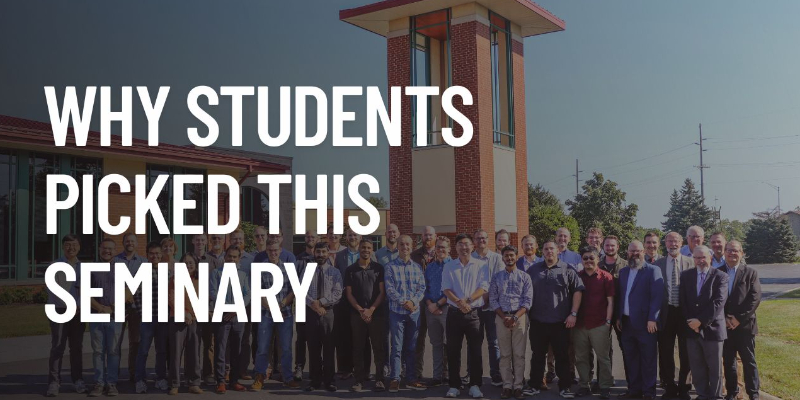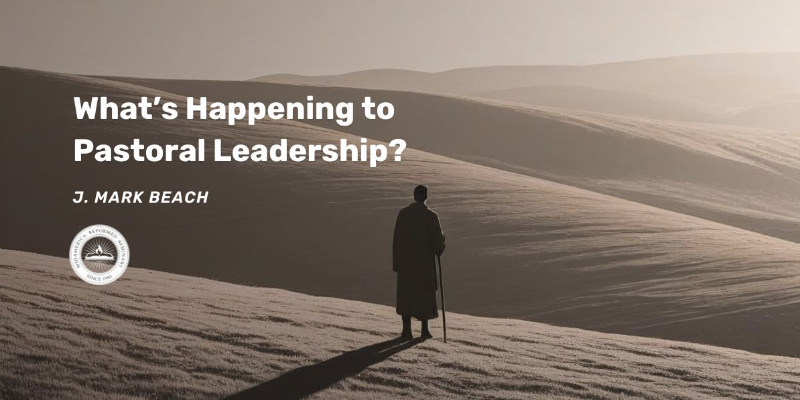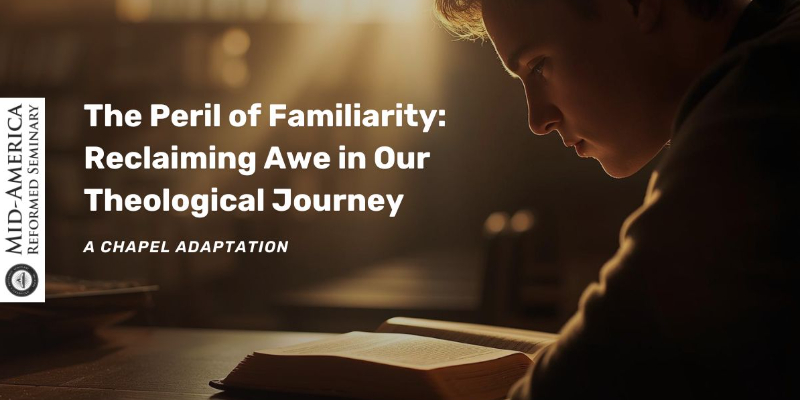
Spirituality of the Church
This article was previously published in the December 2021 issue of The Messenger.
My evening class this fall is on the Spirituality of the Church (SOTC), based on a good deal of work that I’ve done, including a published Ph.D. dissertation on the subject and an upcoming book with Crossway (working title: The Church’s Spiritual Calling). This new work is intended to be an examination of the relationship of the church to other institutions (like the family and the state), in which we see that the church has a distinct spiritual calling, a calling that only it can carry out. We will see historically that the church has at times claimed a supremacy that she does not have—over the state, especially—and that she has, at other times, allowed the state to dominate her. Part of the genius of the Reformation was the rediscovery that the state is not over the church or vice-versa, but that all institutions are properly under God. The spirituality of the church then could be helpfully recovered for the ongoing dialog of how the church is to relate to the world in which it finds itself, both in how it distinguishes itself from the world and how it gives itself to the world.
The highly charged partisan political currents can impact the church as well as civil society, especially when it comes to the temptation of those on both extremes—left and the right—to bring social, economic, political, and like agendas into the church. The church as church may have something to say about present concerns (e.g., abortion, same-sex marriage, etc.), which is to say that God’s Word may address such, usually in principle though, not in detail; in any case, not in a way that renders the church just another voice in the current cacophony of shouted political slogans, but that contributes a proper faith perspective to vexing moral questions in the public square. We need to be salt and light, to witness to the power of Christ and His gospel in an unsavory, dark world in a way that does not avoid the moral issues of our time, bringing a clear prophetic witness to them, but also does not allow them to swamp the boat so that the gospel gets sunk in a sea of cultural concerns.
The SOTC is today either forgotten as a concept or remembered only for its abuses, e.g., justifying the church not addressing American slavery and the racial hatred that especially developed in its wake, including iniquitous Jim Crow laws. The doctrine of the SOTC, however, is connected, first, to the development of the doctrine of the work of the Holy Spirit that was underdeveloped, or overleapt, in the Middle Ages and given extensive treatment only in the Reformation, especially by John Calvin and his theological heirs. The SOTC relates to the reality that the church is supremely a spiritual institution (not a biological one, as is the family, or a civil one, as is the state) and that its power is moral and suasive (not legal and coercive, as is state power), ministerial and declarative (not magisterial and legislative, as is power in the Roman Catholic Church). Thus, the church is an institution gathered and perfected by the Spirit, having chiefly spiritual concerns, carried out in a spiritual fashion, by a Spirit-indited use of the means of grace.
In the Old Testament, Israel had a theocracy. However, her theocracy was unlike that of the nations about her. Theocracy in Babylon or Egypt, for instance, meant that the king was divine or semi-divine, ruling as an absolute potentate, and did not necessarily clearly distinguish the civil ruler from the priestly caste. The king in Israel was clearly limited and did not rule absolutely. Additionally, the priesthood and the kingship were clearly meant to be distinguished. Thus, even in the OT theocracy, there was limits placed on the civil power and a distinction made between the civil ruler and the priesthood. When the church was given its Great Commission (Matthew 28:18- 20), our Lord did not call on it to Israelize the world (made clear in Acts, particularly in the Jerusalem Council), even as Islam saw its task at the Arabization of the world. He did call on it to go into every nation and teach obedience to Christ, her Lord and Savior. That there was a distinction between the church and state as institutions became immediately clear, however, in the ten waves of persecution experienced by the ancient church as she took the gospel to the world. Christianity was regarded as an illegal religion and the church had to develop her life separate from the state.
With the conversion of Constantine (312) and the Edict of Milan (313), Christianity went from being illegal to most favored and even established (by the edict of Theodosius I in 380). This thrusted the emperor into a role that he had not had in the church and much strife followed. Augustine, in City of God, unlike Eusebius in his Constantinian triumphalism, argued that the kingdoms of this earth, including the Roman Empire, rise and fall and that only the heavenly kingdom is eternal. Later in that century, the Empire fell in the West (476 A.D.). Into this power vacuum entered the church and particularly the rule of the Bishop of Rome, who comes to be called the Pope, unrivaled as a ruler in the West until the rise of the Holy Roman Empire, with Charlemagne, Otto I and others, in later centuries. In the Middle Ages, the Pope and the church came to claim authority over the state. The continuation of the Empire in the East (Byzantine) and the East/West split of the church (1054) witnessed the rise of Caesaropapism, in which the emperor claimed primacy and the state claimed authority over the church. The Reformation rejected both the models of church over state (Western) and state over church (Eastern), embracing the notion that both institutions are under God, along with other spheres (like family, education, etc.; to use the terminology of Abraham Kuyper). The Scots, particularly, in rejecting Arminianism, Episcopacy, and Erastianism (a Protestant version of state over church) argued for the spiritual independency of the church, what would become known in the 19th c. American context as the doctrine of the SOTC.
Even as the early church developed the doctrine of the person of Christ, chiefly, with the work of Christ awaiting medieval development, especially in the atonement theory of Anslem, so the doctrine of the work of the Holy Spirit remained underdeveloped in the theology of the Middle Ages. Lombard and Aquinas testify to this, with Aquinas’s Summa Theologica moving from the doctrine of the person and work of Christ to the doctrine of the sacraments (as part of his doctrine of the church). The sacraments, to be efficacious in a context without confessing a robust work of the Holy Spirit, require something like an ex opere operato affirmation. While Luther, in developing Augustine’s doctrine of justification to be punctiliar and definitive, rather than a process, advances a proper soteriology, the doctrine of the work of the Spirit, more broadly considered, remained underdeveloped until Calvin in his Institutes, in which the Spirit is seen as the one who brings us to Christ and Christ to us and in so doing applies all the merits and mediation of the Savior. Thus, Calvin’s ecclesiology is clearly preceded by his pneumatology. It is this developed doctrine of the work of the Spirit that marks the church as a spiritual entity, charged to carry out a spiritual task in the world. Charles Hodge and Princeton are the heirs of this, and Hodge links his doctrine of the work of the Spirit with his doctrine of the spirituality of the church.
It is well known that the SOTC in the American context became, in some hands, code for justification for chattel slavery, insofar as it was argued that the SOTC forbade the church as the church from addressing an institution established as part of civil society. Such a claim merits a review of the question of slavery and race in America, noting the iniquity of the institution and its attendant racism (as unfit for those made in the image of God, especially to be treated this way by fellow Christians, which most Americans professed to be). At the time of the U.S. Constitution, slavery seemed to many on its way out, before being given new life by the cotton gin and other developments. Whereas many in the Presbyterian Church had a negative view of it in colonial times, and even as late as 1818 condemned it wholesale with a remarkable statement by the PCUSA General Assembly (especially so in the wake of the decision deposing the abolitionist George Bourne), many Presbyterians, Baptists, Methodists, and others capitulated to the tenor of the times. Slavery went from an institution that was viewed as a necessary evil in the colonial and early American nation days to morally neutral in the 1820s and 1830s to a positive good on the part of its supporters in the 1830s and 1840s.
Though the Assembly never officially repudiated its 1818 statement condemning slavery, it took important action in 1846, noting that the desire to have the Presbyterian Church act more decisively in opposing slavery was tantamount to asking the church to dissolve itself. Significantly, the Free Church of Scotland responded critically to this action of the Assembly. This is significant because it was this church that had pioneered the arguments for the spiritual independency of the church that became the doctrine of the SOTC in the American context. It is also the case that the Covenanters had always argued against slavery and forbade its members from slaveholding. Charles Hodge was dubious about the claims of the SOTC as forwarded by James Henley Thornwell and some others at the 1859 and 1860 General Assemblies of the PCUSA. However, at the 1861 Assembly, Hodge was the chief architect of the opposition to the Gardner Spring Resolution, which Hodge rightly argued sought by its statement of support for the Lincoln administration to decide the political question. Hodge embraced a doctrine of the SOTC that did not muzzle the prophetic voice of the church and at the same time protected the church from being engulfed by and giving way to political concerns. Hodge did not think that the actions of the church, including the pronouncements of her pulpits, should be narrowly political, about matters that would divide good men who had the same doctrinal confession.
Hodge continued to distinguish that which the church as the church ought to address, respecting the civil magistrate and society more broadly. He witnessed to his dismay the Presbyterian church go from being arguably squeamish about addressing civil matters to a too-ready willingness to politicize both the church’s judicatories and her pulpits. The Civil War contributed greatly to this politicization, as those that fought together on the same side came to feel that they had more in common with each other, even if divided by historic Old School/New School concerns, than they did with the other side. So, reconciliation talks began between Old and New School, which had divided in 1837, slavery having played a minor role in that division. Hodge supported reconciliation between Old and New Schools, but not on the grounds that it was being pursued. Hodge regretted that the union talks between the two schools placed a premium on aping the civil reunion that had occurred in the aftermath of the War, fearing that in the ecclesiastical context the unity of the church was being stressed at the expense of her purity. The Old and New Schools reunited in 1869 on a political rather than a theological basis, a reunion opposed by Hodge, who insisted that the theological issues that had divided the two schools be dealt with and not marginalized. The history of the PCUSA subsequent to that was one in which that politicization contributed to theological liberalism, the social gospel, and other problems that came to plague the PCUSA.
The SOTC, as noted in the conclusion to my Hodge book (my published dissertation), has been, and can be, used for good or ill. Too many churches today allow the political to dominate the spiritual: mainline churches may be an “us too” chorus for a variety of liberal causes, while conservative churches may sound like the Republican party in worship. The church as the church, as an institution, as opposed to Christians living out their callings in the world, is not a political institution and ought to resist such. It is right that any given congregation be composed of those of various political views (some believing that tax rates should be higher for the wealthy; others insisting on gun rights), while the members agree on fundamental biblical doctrines. This is because the church is a spiritual institution, and its core of agreement builds upon truths that transcend the more ephemeral matters that concern politics. The church needs to agree on what the Bible teaches, but the Bible does not give a detailed blueprint for civil society, and Bible-believing folk should be able to have political differences while maintaining the unity of the Spirit in the bond of peace.

Dr. Alan Strange serves as the Professor of Church History, Registrar, and Theological Librarian at Mid-America Reformed Seminary.
Recent articles




